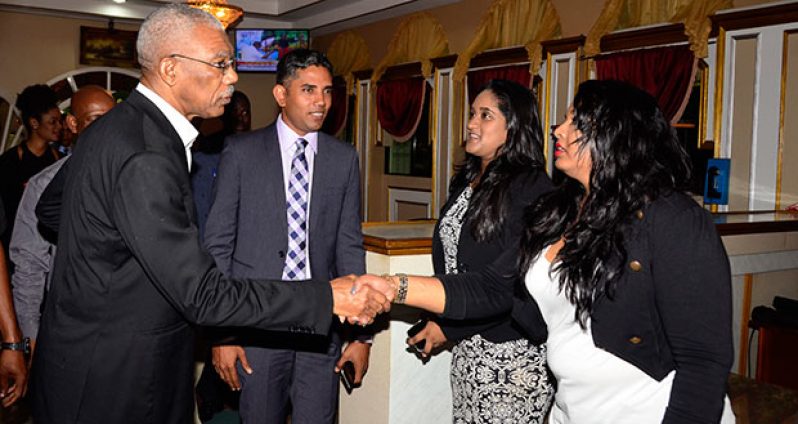PRESIDENT David Granger, speaking at a workshop to train local journalists and other media practitioners in reporting on suicides, yesterday laid out his government’s policy on the media, declaring that the executive will not meddle in the affairs of the private or state media, and reiterating that the state media has responsibility to offer a voice to the opposition and others in society.“The Government of Guyana is committed to the promotion of a high degree of media professionalism. The administration will not undermine the professionalism of state media workers by subjecting them to political direction or interference in their work,” the President said.
The workshop was organised by the Guyana Press Association (GPA), the local office of the Pan American Health Organisation (PAHO) and the Ministry of Public Telecommunications with responsibility for tourism.
“Independent media act as watchdogs of Government. They promote transparency by ensuring that information is provided to the public on the work of Government. They are a source of valuable feedback on the effectiveness of the efforts of the Government. There is no good reason for the state to interfere in the work of the private media,” the President declared.
The President indicated that the Government has no immediate intention to discard state media, which now consist of the Guyana Chronicle newspaper and the National Communications Network (NCN), which broadcasts via radio and television. He said the state is obliged to preserve, protect and promote citizens’ right to freedom of expression, and the state does that by enforcing constitutional and legal guarantees, and by providing those citizens with access to information.
“Free access to information is an inalienable right of every citizen, and an indispensable condition of democratic society,” President Granger said.
He said that citizens’ access to information is a democratic right, and information is necessary for citizens’ informed participation in society.
“Restrictions on the flow of information deny citizens the opportunity to participate fully in decision-making, and thereby impair democracy,” the President affirmed.
The President noted that Article 146 of the Constitution provides: “Except with his consent, no person shall be hindered in the enjoyment of his freedom of expression; that is to say, freedom to hold opinions without interference, freedom to receive ideas without interference, freedom to communicate ideas and information without interference and freedom from interference with his communication.”
As such, the President said, Article 146 is “an unambiguous and unclouded statement of our supreme law, and an assurance of every citizen’s right to freedom of expression.”
The President said his administration recognises the roles of, and respects the separation of powers among, three branches of government – the Legislature, the Executive, and the Judiciary. AS such, he said, the state media has a duty to report accurately and without bias on all three arms of the state, and the state media is obliged to report the views of all parties in the National Assembly in the course of public business.
Further, he said the state media has a duty to ensure that the opinions of those on the margins of society are heard, and that the media should serve the interests of all the people of Guyana, and not only the Government.
The President said the state will continue to have a presence in the media. He noted that this is necessary because private media are located largely on the coastland, and they do not possess sufficient resources to provide public information to all citizens, especially those in hinterland and rural regions.
“State media therefore are not intended to compete for, or to dominate, the information space. The state is committed to protect citizens’ constitutional right to communicate ideas and to receive information. State media will continue to provide this service in a dispassionate and professional manner.
“State media have a duty to report on national development and projects, since such information is often not sensational enough to be given attention by the private media,” the President declared.
Further, the President said the state media has an obligation to inform the people about community development projects, and the people are entitled to know the details of those projects.
“State media also can play an important role in disseminating economic, environmental, health and climate advisories, and provide information about public services.”
He said the administration’s policy is to develop ten strong regions administered by ten “capital towns.”
“It is our expectation that, in the not-too-distant future, each ‘capital town’ could contribute to closing the communications gap with its citizens by establishing its own media — newspapers, radio and television, along with facilitating the prevalent social media.”












